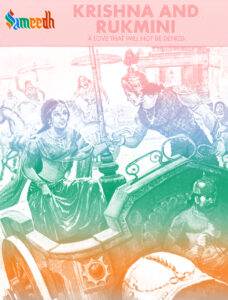Rukmini is a prominent and revered figure in Hindu mythology, particularly within the Vaishnavism tradition. She is one of the principal queens and consorts of Lord Krushna, considered an incarnation of the Supreme Goddess Lakshmi. The story of Rukmini is often associated with her devotion to Krushna and their divine union.

Rukmini was the princess of Vidarbha, and she was known for her beauty, virtue, and wisdom. Despite being a princess, she chose Krushna as her ideal husband through her devotion to him. Rukmini had heard about the virtues and heroic deeds of Krushna and decided to choose him as her husband during her Swayamvar (a ceremony where a princess chooses her groom). Krushna, aware of her devotion, arrived at the ceremony, and Rukmini secretly prayed for his acceptance.
Rukmini’s brother, Rukmi, opposed her choice of Krushna and wanted her to marry Shishupal, a powerful king and ally of the Kauravs. Rukmi arranged her marriage with Shishupal against her will, leading to a tense situation. Krushna, along with Rukmini’s consent, intervened and thwarted the attempt to force her into a marriage with Shishupal. A confrontation ensued, and Krushna defeated Rukmi and Shishupal.
After the victory, Krushna married Rukmini in a grand ceremony in Dwarka. The marriage of Krushna and Rukmini is celebrated as a divine union, symbolizing the bond between the devotee’s soul and the Supreme Being. The Dwarkadhish Temple is associated with the story of Lord Krushna’s dwelling in Dwarka and his marriage to Rukmini. Rukmini and Krushna’s union resulted in the birth of several children, including Pradyumn, who played a significant role in later episodes of the Mahabharat.
Rukmini’s devotion to Krushna and their divine marriage are often celebrated in various Hindu traditions. The story highlights themes of love, devotion, and the triumph of divine will. Rukmini is considered an exemplary devotee and an embodiment of virtues, and her worship is an integral part of Krushna bhakti traditions.